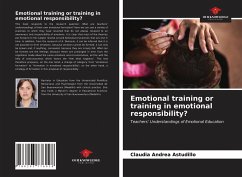This book responds to the research question: What are teachers' understandings of their own emotional formation? Here we can see a variety of practices to which they have resorted that do not always respond to an awareness and responsibility of emotions. It is clear that most of the theories put forward on the subject revolve around behavioural practices that are lost in time. In addition, from the research of A. Damasio, it can be inferred that it is not possible to form emotions, because emotion cannot be formed, it can only be known and, if anything, concealed, because they are simply felt. What can be formed are the feelings because these are prolonged in time from the cognitions made about the same emotions and circumstances, all this with the help of consciousness which favors the "feel what happens". This text therefore proposes, on the one hand, a change of category: from "emotional formation" to "formation in emotional responsibility"; on the other hand, a strategy of formation in this proposal of responsibility.
Bitte wählen Sie Ihr Anliegen aus.
Rechnungen
Retourenschein anfordern
Bestellstatus
Storno








